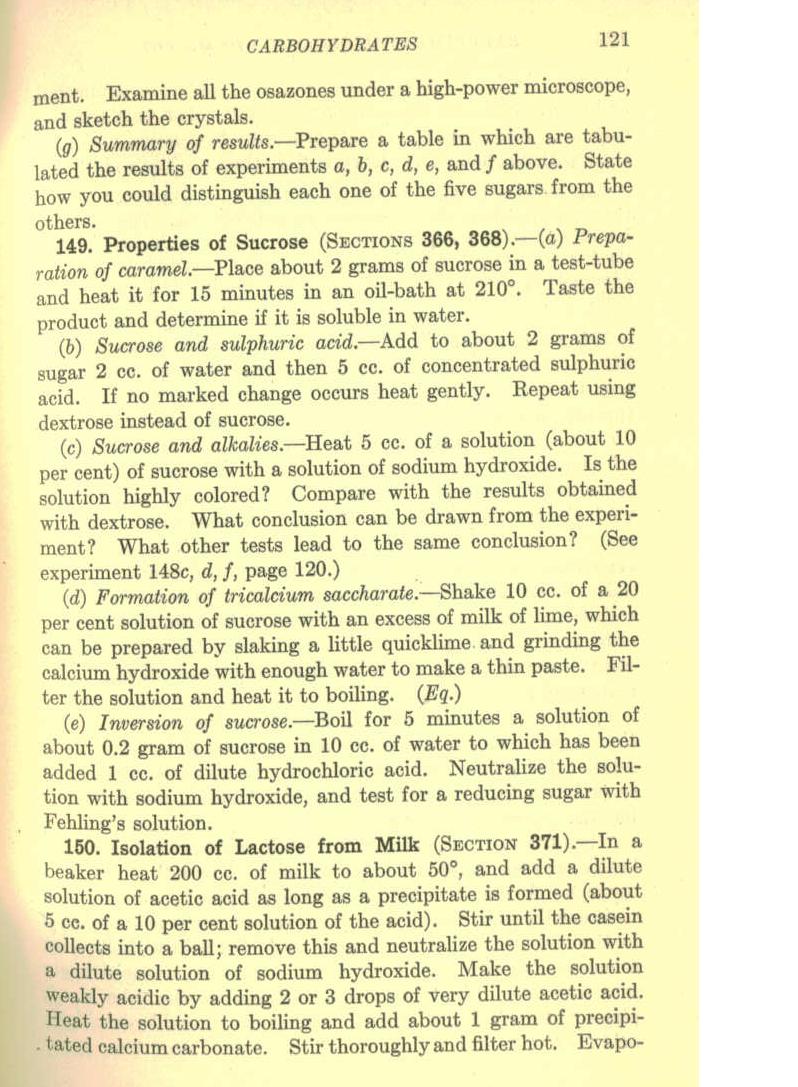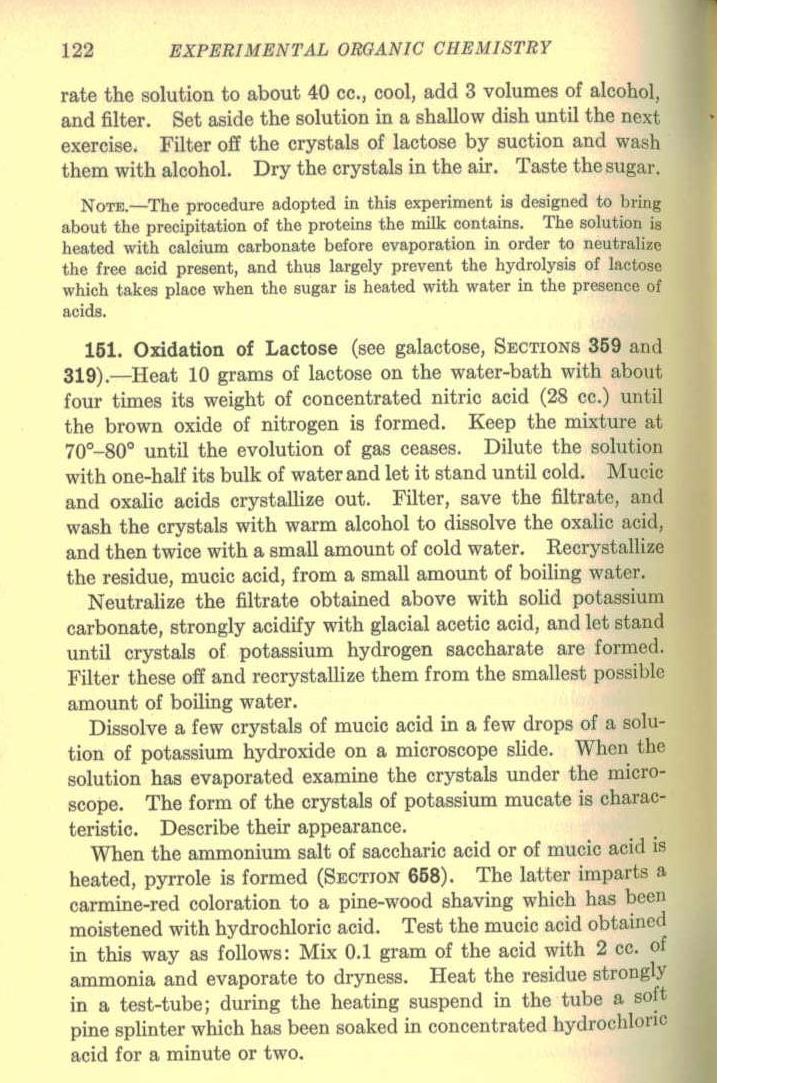frogfot
Hazard to Others
  
Posts: 212
Registered: 30-11-2002
Location: Sweden
Member Is Offline
Mood: happy
|
|
Does that book have anything about isolation of lactose from milk?
Reason I'm asking is because I have a route that doesn't work well.. I got a book on carbohydrates that has following procedure:
Dilute 1 l milk with 2 l of water, add 6 ml acetic acid, filter through cloth and wash residue. Precipitate rest of proteins by boiling, and boil down
soln after filtration.
(procedure was referenced from: Pasteur L. Compt. rend., 1856, 42, 348)
Now the problem is that boiling does not precipitate all proteins (no matter how long you boil..) 
They precipitate as long as mass is liquid and boiling.. and no I didn't misinterpret precipitate with lactose (it is insoluble in water).
I've already tried to do the evaporation with some activated carbon added.. this makes no difference, although this gives a snow white product..
It would be ok to precipitate the lactose together with proteins by addition of ethanol, and then redissolving, filtering solid proteins and
evaporating pure lactose soln again.. but this seems to be tedious... Isn't there a bullet-proof way to precipitate all proteins (and fats)..?
|
|
|
garage chemist
chemical wizard
    
Posts: 1803
Registered: 16-8-2004
Location: Germany
Member Is Offline
Mood: No Mood
|
|
Lactose from Milk
Try to boil the milk in a pressure cooker. They can reach higher temperatures (about 120°C IIRC).
Adding Formaldehyde also denatures the proteins and causes them to precipitate. Formaldehyde can be made by heating hexamine with dilute H2SO4,
formaldehyde will be generated as a gas and can be dissolved in water.
The standard way to remove proteins from natural products is to add a lead salt, but this would contaminate your lactose.
|
|
|
The_Davster
A pnictogen
      
Posts: 2861
Registered: 18-11-2003
Member Is Offline
Mood: .
|
|
From "Experimental Organic Chemistry", Norris, 1915, 1924. The book is scanned and soon will be upped once touchups are complete.

|
|
|
The_Davster
A pnictogen
      
Posts: 2861
Registered: 18-11-2003
Member Is Offline
Mood: .
|
|
Page 2

|
|
|
frogfot
Hazard to Others
  
Posts: 212
Registered: 30-11-2002
Location: Sweden
Member Is Offline
Mood: happy
|
|
Thanks, for the info and scans, really appreciated. There seems to be no big deviations from the procedures..
In my last test I also was heating the milk with the acetic acid (to boil).. though in the end there was pretty much same result. Now I'm trying
to precipitate the proteins by boiling down soln, diluting and filtering.. did this about 5 times but they just keep on precipitating.. (though amount
of precipitate decrease)
It is strange that they neutralise the acid.. I've seen some other text on the internet where they extracted lactose from "dry milk"..
The proteins was precipitated by acetic acid and it was then neutralised by CaCO3..
IMO, acetic acid (specially that diluted) is not enough to hydrolise the lactose.. I think they mention this only for the educational purpose.
This is partially confirmed by fact that I've seen a hydrolysis procedure of lactose where it's boiled in 2% H2SO4 for 2 h!..
Also, at some point I thoat that my precipitate was acylated lactose..  but
this is highly improbable.. but
this is highly improbable..
The point I had in mind with this, is to optimise the extraction (and make a simple methodics).. that is, decrease time, amounts of used alcohol and
try to avoid rare/expencive chems.. (although pressure cooker is not rare, many people doesn't have it)
Have a feeling that while using formaldehyde to precipitate proteins, it may react with alcohol groups on lactose..
Btw, I found that activated carbon is not worth to use.. Heres some raw yields I got from 200 ml milk using different amounts of activated carbon for
purification:
3g C gave 4,75 g lactose
2g C gave 5,37 g
0g C gave 7,69 g
Note, less than 10% of insoluble crap is present.. estimated by a recryst..
So, pattern is obvious.. Though I didn't expect such polar sugar to be desorbed by nonpolar carbon..
According to the package, our milk contains 5 g carbohydrates per 100 ml. So, yields are not that bad.
The recrystallisation procedure I use is quite similar that from the procedure that rogue chemist scanned. I simply boil down soln (5-8g dissolved
lactose is boiled down to 8-10 ml), then add 2 volumes of ethanol and leave it at -20*C for 24 h (seeding actually helps). This usually returns about
82% of the product (tested by numerous recrystallisations). So, 1 l milk would require 100 ml ethanol.. not too big waste (alcohol can be reused..).
[Edited on 19-3-2005 by frogfot]
|
|
|
The_Davster
A pnictogen
      
Posts: 2861
Registered: 18-11-2003
Member Is Offline
Mood: .
|
|
Today I did the lactose from milk prcedure from the scans I posted. I have just done the hot filtration step. The step stating to evaporate to 40mL,
is that on heat or just at room temp for a long time?
|
|
|
frogfot
Hazard to Others
  
Posts: 212
Registered: 30-11-2002
Location: Sweden
Member Is Offline
Mood: happy
|
|
On heat ofcaurse.. cause it says cool after.
I took a rest from the lactose experimenting.. did totally more than 20 runs, changing different parameters. Can't get more than 6g purifyed
lactose from 200 ml milk. The only thing left is to test the product if I got any galactose from hydrolysis of lactose. Several books use paper
chromatography for this.. gonna see how this goes..
|
|
|
mericad193724
Hazard to Others
  
Posts: 121
Registered: 4-6-2006
Location: New Jersey, USA
Member Is Offline
Mood: why do you care?
|
|
I am currently attempting the extraction of lactose from milk...and I messed up the procedure.
I made the solution slightly basic instead of slightly acidic...I was just boiling down the liquid to 40ml with Calcium Carbonate, but the solution
went from yellow to light brown to dark brown. The liquid smells like "slightly burnt toast." What is happening as a result of my mistake (making the
solution basic), will I still end up with Lactose or did I just completely screw up the experiment?
thanks
Mericad
|
|
|